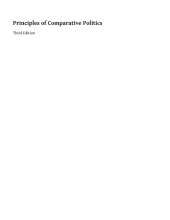Elections and electoral systems - Elections and electoral integrity
3 important questions on Elections and electoral systems - Elections and electoral integrity
The increasing use of legislative and presidential elections around the world (in democracies as well as dictatorships) has been accompanied by growing concerns about electoral integrity, which refers to:
Five factors that influence the electoral integrity in a country are:
- Domestic cultural constraints (level of economic development, dependence on natural resources, legacy of conflict, inhospitable geography)
- International community: countries that are more integrated into the global system will be more likely to adopt international norms and practices that encourage electoral integrity.
- Non-partisan international organizations that monitor elections
- Institutional design
- Electoral management bodies
Benford's law states that:
The question on the page originate from the summary of the following study material:
- A unique study and practice tool
- Never study anything twice again
- Get the grades you hope for
- 100% sure, 100% understanding
































